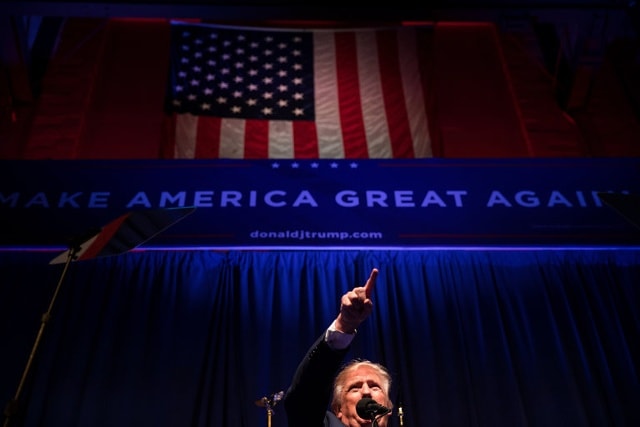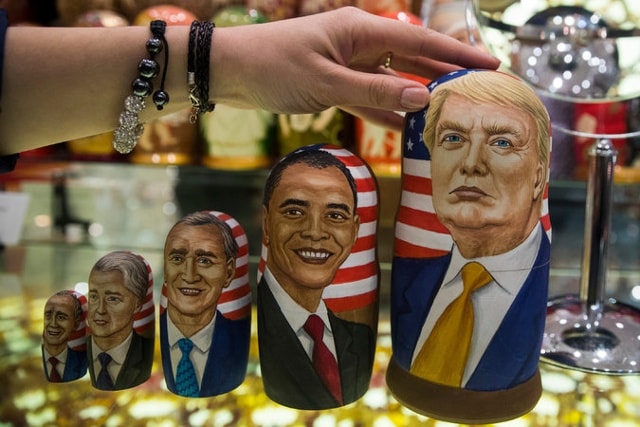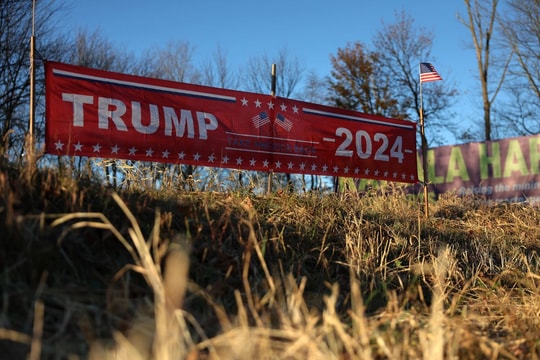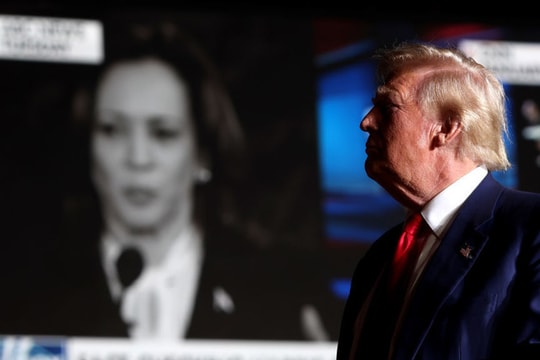Trump's victory upsets world order
(Baonghean.vn) - Donald J. Trump's election victory on the night of November 8 caused shockwaves beyond the borders of the United States, upsetting the world order that has existed for decades and raising profound questions about America's position in the world.
 |
| Donald Trump's victory predicts an America that focuses more on domestic issues, leaving the world to fend for itself. Photo: NYT. |
For the first time since before World War II, Americans elected a president who promised to overturn the internationalism practiced by his predecessors from both parties and build walls of separation, both visible and invisible. Trump’s victory signaled a future America that would focus more on domestic issues and leave the world to fend for itself.
The outsider revolution that has brought Trump to power in Washington’s bipartisan establishment also reflects a fundamental shift in international politics, as evidenced by events such as Britain’s referendum on whether to leave the European Union. Trump’s success could galvanize populist, nativist, nationalist, and closed-border movements in Europe and elsewhere.
Global markets were immediately affected by the results of the November 8 election, and people around the world were left scrambling to figure out what the results meant locally. For Mexico, it seemed to herald a new era of confrontation with its northern neighbor. For Europe and Asia, it could rewrite the rules of modern alliances, trade agreements and foreign aid. For the Middle East, it portends a possible alignment with Russia and renewed conflict with Iran.
“You can never tell,” said Agustín Barrios Gómez, a former member of Congress in Mexico and president of the Mexican Image Foundation, an organization that promotes the country’s reputation and image abroad.
Sharing the same view, Crispin Blunt, Chairman of the Foreign Affairs Committee in the British House of Commons, said: "We have fallen into a state of uncertainty and indeterminacy."
Many have linked Mr Trump’s victory to Britain’s vote to leave the European Union and see the potential for a broader disintegration of the contemporary international system. “After Brexit and this election, anything is possible,” Gérard Araud, France’s ambassador to the US, tweeted. “The world is collapsing before our eyes.”
The US election truly captivated people from all over the world on Tuesday night: night owls tuned in to watch the television in a budget hostel in Tel Aviv, computer engineers updated the results on their laptops in Hong Kong, and even former pipeline terrorists in Nigeria’s remote Delta region expressed concern about what a Trump victory would mean for their countries.
It is hardly surprising that most of the world supports Hillary Clinton over Mr. Trump - the man who shaped the foreign policy of "America First".
He has promised to build a wall along the border with Mexico and temporarily ban Muslim immigrants from entering the U.S. He has questioned Washington’s longstanding commitment to NATO allies, called for cuts in foreign aid, praised Russian President Vladimir Putin, vowed to tear up international trade agreements, attacked China and suggested that Asian allies develop nuclear weapons.
Polls show that Clinton is favored in every country except Russia. Last summer, the Pew Research Center found that people in all 15 countries surveyed believed Clinton would do the right thing on foreign affairs more than Trump, by a margin of 10 to 1.
 |
| A patrol agent on the US-Mexico border. Mr Trump’s success could fuel populist, nativist, nationalist, border-closing movements that are already present in Europe and spreading to other parts of the world. Photo: Getty. |
Trump’s military and economic rhetoric has left many countries contemplating a path forward without American allies. “The question is whether the United States will continue to engage in international affairs as a reliable ally to its friends and allies,” said Kunihiko Miyake, a former Japanese diplomat who now teaches at Ritsumeikan University in Kyoto. “If the United States does not do so, all of America’s European, Middle Eastern and Asian allies will have to reconsider how they defend themselves.”
In Germany, where US troops have been stationed for more than seven decades, the prospect of a withdrawal seems to be causing some confusion. “It would be the end of an era,” Henrik Müller, a journalism professor at the University of Dortmund, wrote in Der Spiegel. “The postwar era in which US nuclear weapons and their military presence in Europe protected the West and, later, the Central European countries would be over. Europe would have to take care of its own security.”
Norbert Röttgen, chairman of the German parliament’s foreign policy committee and a member of the ruling party, said Trump was “completely unfit” to take office. “At the very least, a Trump victory could lead to the worst estrangement between America and Europe in many years,” he said.
Perhaps nowhere is Mr Trump’s victory more alarming than in Mexico, which has resisted Mr Trump’s promises to build a wall and make America’s southern neighbor pay for it.
“I see a clear danger,” said Rossana Fuentes-Berain, director of the Mexico Media Research Lab and founder of the Latin American edition of Foreign Affairs. “Every moment is a challenge. Every move or statement is something that will not make us comfortable in the region—and that is a loss for everyone.”
With $531 billion in goods trade last year, Mexico is the third-largest trading partner of the United States, behind Canada and China. According to Mexico, the supply chains in both countries are interdependent, with American goods and components shipped to Mexican factories to be manufactured into products, then shipped back to the United States for sale. And 5 million American jobs directly depend on trade with Mexico.
The Mexican peso immediately fell 13% after the election, its biggest drop in decades. Barrios Gómez, a former congressman, predicted a short-term devaluation of about 20% for the peso, as well as a recession in Mexico “as supply chains across the continent become less flexible and investments evaporate.” He said the business community there was “in a panic.”
The economic fallout could be even more far-reaching. Izumi Kobayashi, vice president of Japanese business conglomerate Keizai Doyukai, predicts a drop in foreign investment in the US as Trump-skeptical businesspeople wait to see what he will do.
“He has emphasized the negative aspects of global markets and globalization,” Ms. Kobayashi said. “But at the same time, it is really difficult to go back to the old world of commerce. How does he explain to those who have benefited, and the fact that there is no way to go back to the old business model?”
The anxiety over Mr Trump’s victory abroad extends far beyond the country’s traditional partners. Abubakar Kari, a political science professor at the University of Abuja, said most Nigerians believe the Trump administration will not care about issues beyond the US.
Macharia Gaitho, one of Kenya’s most prominent commentators, wrote before the vote count was announced, stating: “If Trump wins, we will have to reassess our relations with the United States.”
 |
| Traditional Russian matryoshka dolls depicting (from left) Presidents George Bush, Bill Clinton, George W. Bush, Barack Obama and President-elect Donald J. Trump in a shop in Moscow. Photo: AP. |
One of the few places where Trump’s victory was greeted with enthusiasm was Russia. Russia played a huge role in this year’s US presidential election, with Mr Trump praising Mr Putin and US investigators concluding that Russians hacked Democratic Party emails.
Vladimir Frolov, a Russian international affairs analyst, commented: “Trump’s presidency will plunge the US into a comprehensive crisis, including an economic one. The US will be preoccupied with its own problems and will not bother Putin with questions.”
“As a result, Moscow will open up a window of opportunity in the geopolitical sphere. For example, it could gain control over the former Soviet Union and parts of the Middle East,” he added.
Others have tried to find a silver lining. British lawmaker Blunt said he was encouraged by Trump’s choice of Indiana governor Mike Pence as his running mate, and suggested Britain could be an exception to the new president’s hostility to trade deals.
Israel is another place where Trump has some support, largely because his people believe he will give them a free hand in dealing with their longstanding conflict with the Palestinians. But Prime Minister Benjamin Netanyahu and other Israeli leaders and commentators are concerned about the US abandoning its involvement in a Middle East plagued by war, terrorism and upheaval.
“Decisions cannot be postponed,” said Yohanan Plesner, a former member of the Israeli parliament who is now president of the Israel Democracy Institute. “The situation in Syria is chaotic. The instability in the region continues. The United States must decide whether it wants to play an active role in shaping regional developments.”
And even some countries that might have expected to benefit from a US “retreat” are worried about the potential impact. In a rather unusual response, China is concerned about Trump’s promise to withdraw US troops from Asia. “If Trump really withdraws troops from Japan, the Japanese may develop their own nuclear weapons,” said Shen Dingli, a professor of international relations at Fudan University in Shanghai. “South Korea may also nuclearize if Trump cancels missile deployments and leaves the country alone to deal with the North Korean threat. How can that be good for China?”
For American voters, that is not the case. After decades of worrying about what is good for other countries, they have decided that it is time to worry about what is good for America. And Mr Trump has promised to do just that, even if the rest of the world does not want it.
Thu Giang
(According to NYT)
| RELATED NEWS |
|---|



